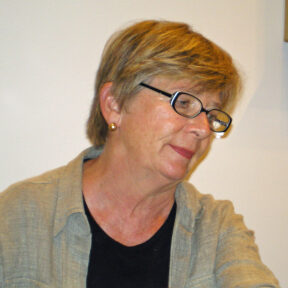
Barbara Ehrenreich
: Photo from Wikimedia Commons / Author of Photo: David Shankbone (1974–) wikidata:Q12899557Overview
* Socialist
* Feminist
* Sixties radical
* Honorary Chairwoman of the Democratic Socialists of America
* Author of Nickel and Dimed
Barbara Ehrenreich was born in August 1941 in Butte, Montana. In 1963 she graduated from Reed College, where she majored in physics, and in 1968 she received a Ph.D. in cell biology from Rockefeller University. After completing her studies, Ehrenreich turned her attention to political and anti-war activism. She met her first husband, John Ehrenreich, during an anti-Vietnam War campaign. They had two children, Rosa and Benjamin, before eventually divorcing. “With the birth of my first child in 1970,” writes Ehrenreich, “I underwent a political, as well as a personal, transformation. I’d never thought much about my gender, but the prenatal care I received at a hospital clinic showed me that PhD’s were not immune from the vilest forms of sexism. Bit by bit, I got involved with what we then called the ‘women’s health movement,’ advocating for better health care for women …”
In 1983 Ehrenreich married a union organizer named Gary Stevenson, whom she would divorce in the early 1990s.
Between 1994 and 1998, Ehrenreich was a regular columnist for Time magazine. Since then. her writings have also appeared commonly in The Progressive, The New York Times, Mother Jones, The Atlantic Monthly, Ms., The New Republic, Z Magazine, The Nation, and the socialist publication In These Times.
Candid about her affinity for Marxism, Ehrenreich became the Honorary Chairwoman of the Democratic Socialists of America. When the Communist Manifesto was re-released on its 150th anniversary in 1998, Ehrenreich celebrated the event. She noted that in producing the Manifesto as a commercial product, capitalists were — as Lenin had once predicted — providing the rope that eventually would hang them.
In 1998 and 2000, Ehrenreich taught essay-writing at the UC Berkeley Graduate School of Journalism.
In a November 1999 article for The Humanist, Ehrenreich, a self-described fourth-generation atheist, wrote that religions are essentially the same as cults, the only difference being the number of people involved. She described Catholicism as “a hundred million people bowing down before a flesh-hating, elderly celibate.” The Republican Party, she said, is composed of “a few million gun-toting, Armageddon-ready Baptists.” And she recounted her childhood horror at having to say the Pledge of Allegiance in school, especially after the words “under God” were inserted.
In her 2001 book Nickel and Dimed: On (Not) Getting by in America — which is still assigned to students on hundreds of college campuses nationwide — Ehrenreich asserts that atheism is the tradition of the working class. She refers to Jesus as a “wine-guzzling vagrant and precocious socialist”; she writes that a precursor of the trade union movement was a working-class atheism called the free thought movement, which sprang from “poor people whose distrust of priests and ministers was part and parcel of their hatred of bosses and bankers”; and she reasons that “if there is no God or no evidence of God and certainly no evidence of a very morally engaged god, then whatever has to be done has to be done by us.”
In the immediate aftermath of the 9/11 attacks, Ehrenreich wrote that the real threats to America were not Islamic terrorists, but poverty, illiteracy, and environmental degradation. In an interview with On the Page, she recoiled at the characterization of the 9/11 terrorists as evil: “The word evil always makes me nervous. It’s not just a more intense form of bad; it’s usually a signal that we’ve stopped thinking…. The real challenge is to look at the terrible acts and try to work our way towards an understanding of how a human being might undertake them.” Such a task, she said, would require “an empathetic ability.”
On September 20, 2001, Ehrenreich was a guest speaker at a New York City gathering to honor the work of Richard Cloward (co-creator of the Cloward-Piven Strategy), who had died a month earlier. Other speakers included such notables as Howard Zinn, Joel Rogers, June Jordan, Gus Newport, Tim Sampson, Cornel West, Miles Rappaport, and Frances Fox Piven.
In 2003 Ehrenreich was a signatory to the widely publicized Not in Our Name (NION) “Statement of Conscience,” a Revolutionary Communist Party project which asserted that America’s war on terror posed “grave dangers to the people of the world” in the form of “[w]ar and repression” that “has been loosed on the world by the Bush Administration … [in] a spirit of revenge.”
During the summer of 2003, Ehrenreich joined a number of fellow socialists in signing onto a “Campaign for Peace and Democracy” statement suggesting that repression in Cuba could ultimately be traced to America’s opposition to the Castro government, and denouncing “six decades of [U.S.] exploitation and imperial control of Cuba.” The statement further characterized U.S. involvement in Latin America as “criminal.”
In 2006 Ehrenreich endorsed Code Pink‘s “Women Say No to War” campaign, which demanded the complete and prompt withdrawal of American troops from Iraq, on grounds that “the foreign occupation of Iraq has fueled an armed movement against it, perpetuating an endless cycle of violence.” Other endorsers included Cindy Sheehan, Susan Sarandon,Lynn Woolsey, Cynthia McKinney, and Barbara Lee.
Ehrenreich is a board member of NORML — the National Organization for Reform of Marijuana Laws, a pro-legalization marijuana lobby.
She is a great admirer of Institute for Public Accuracy founder Norman Solomon, calling him “one of the sharpest media-watchers in the business.”
For additional information on Barbara Ehrenreich, click here.